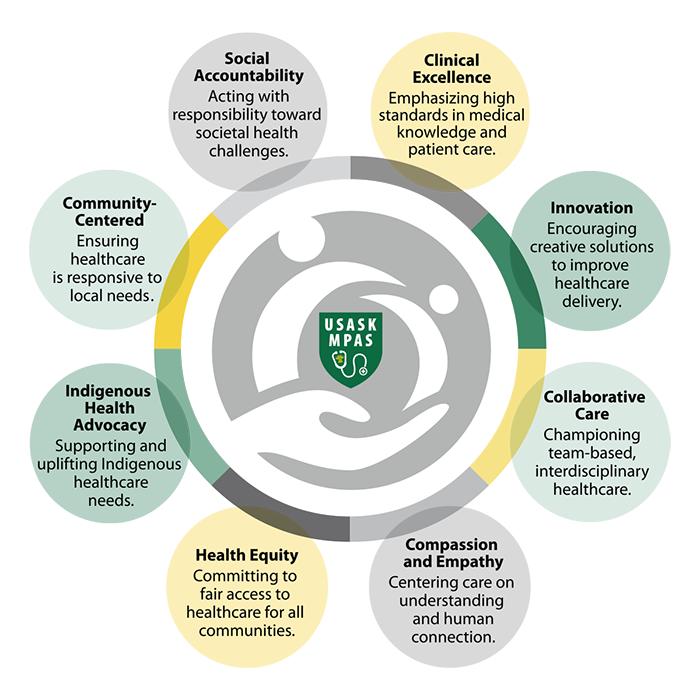Overview
Our curriculum is structured to ensure students benefit from interprofessional education, allowing them to collaborate and learn alongside students from various health care disciplines. They will engage in a multi-layered learning environment that integrates classroom learning, simulation labs, and clinical practice.
Students will build connections through national networking with professionals and peers across Canada, fostering a network that supports career growth and development. Additionally, they will embrace innovation by adopting cutting-edge practices and technologies that prepare them for the evolving landscape of health care. This innovative curriculum prepares our graduates to excel as competent and compassionate Physician Assistants, ready to meet the health care needs of diverse populations.
Year 1 – Building Foundations
- This course is designed to provide students with the knowledge and skills to integrate applied basic sciences (anatomy, physiology, pharmacology, microbiology) with clinical sciences to completely diagnose and treat numerous conditions and pathologies.
- This course will have both Lecture and Lab requirements
- This course provides students with the knowledge, skills, and attitudes necessary to deliver exceptional clinical care in real world settings. Emphasis is placed on history taking, physical examination, communication, clinical assessment, and procedural competence. Through hands-on practice with simulators and models, students will develop proficiency in diagnostic and therapeutic procedures while fostering a compassionate, patient centered approach. This course prepares students to excel in diverse clinical environments and contribute effectively to interprofessional healthcare teams
- This course will have both Lecture and Lab components
- This course introduces students to the essential principles and practices of professionalism as integral to the role of a Physician Assistant (PA). The curriculum addresses ethics, cultural competence, interprofessional collaboration, self-regulation, and leadership. Students will develop the foundational knowledge and practical skills needed to navigate the ethical and professional challenges of clinical practice within the Canadian healthcare system.
- This course is Lecture-based
- This course introduces learners to the principles of evidence-based medicine for clinical decision-making – including formulating focused research questions, searching for and evaluating evidence, and integrating evidence with patient values and preferences.
- This course will focus on applying ethical research practices in quality improvement/quality assurance in clinical medicine as well as on action research as a means of reflective practice for professional growth. We will critically appraise various qualitative and quantitative research methodologies, literature review approaches, and knowledge mobilization strategies.
- MPAS 801 runs longitudinally over the entire first year of the MPAS program over all three terms.
Year 2 – Clinical Experience
The second year focuses on applying the knowledge and skills acquired in the first year through various clinical placements.
- MPAS 802 runs longitudinally over the entire second year.
- The second half of the Research and Evidence-based Medicine course focuses on the completion of a capstone research project, as well as completion of the College of Graduate Studies requirements for graduation.
- All students will participate in a capstone project (in various configurations (e.g., solo, pairs, small groups, join existing research team, etc.) that leverages a research question to guide literature review, research method, data collection and analysis, and communication of findings.
- Learners will also present their capstone projects to fellow scholars and colleagues.
- This 48-week practicum follows a modified longitudinal integrated clerkship model. Learners will gain clinical experience in diverse health care settings in Saskatchewan, including both urban and rural, enhancing their clinical expertise and professional practice. Students will develop relationships with community members, and will foster a spirit of reciprocity with other allied health professionals, and community members.
- Students will be scheduled in multiple locations throughout Year 2.
- Consideration of learner preference may be provided during the scheduling.
College of Graduate Studies Requirements Include:
- Introduction to Ethics and Integrity (GPS 960)
- Ethics and Integrity in Human Research (GPS 961)
MPAS Capstone Research Project
The MPAS Capstone Research Project is scholarly experience of up to 12–18 months designed to immerse Physician Assistant students in applied health research. This initiative emphasizes mentorship, research literacy, and real-world impact, while accommodating the timeline and clinical demands of the MPAS program.
The Call for submissions is open now!
Project proposals due December 12, 2025.
Student matching with projects, as applicable, will occur from late December 2025 to early 2026.
Application Process
- Faculty Call for Proposals: Faculty members are invited to submit project proposals using the MPAS Capstone Research Proposal Form. Proposals are due Friday, December 12, 2025.
- Project Review: Submitted projects will be screened by MPAS research co-chairs to ensure feasibility, relevance, and alignment with program outcomes.
- Posting of Projects: All feasible projects will be posted for students to review in early 2026. Unlike other programs, all suitable projects will be offered; matching is non-competitive.
- Student Matching: MPAS students will review available projects and indicate preferences. Student-supervisor agreements will then be finalized and submitted to the MPAS office.
- Project Start: The MPAS Capstone Research Project is part of a broader research course in which students receive instruction in Research and Quality Improvement Methodologies. Students will begin their projects in alignment with MPAS program timelines, engaging in research over a period of up to 12–18 months, with quarterly check-ins to monitor progress. All Capstone Research Projects for the Class of 2027 must be completed and presented by June/July 2027, in alignment with program graduation timelines.
Contact the MPAS office with any questions at mpas@usask.ca
Some research, logistical and administrative support will be available from the MPAS team through a staff Research Navigator, who will be able to provide guidance and assistance with elements such as REB applications, data collection instruments, and proposal suggestions.

